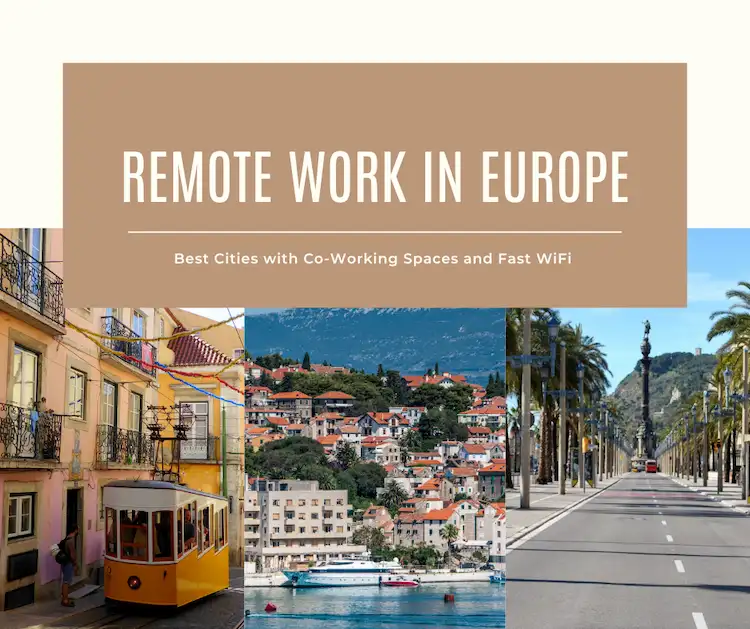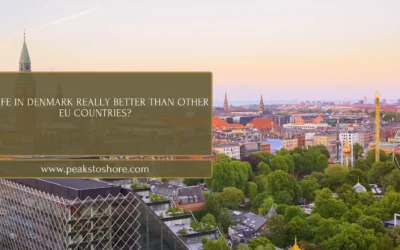Thinking about packing your laptop and working remotely from Europe? Whether you’re a digital nomad, freelancer, or remote employee looking for a change of scenery, Europe offers an incredible blend of culture, convenience, and connectivity. But here’s the truth—not all European cities are equally remote work-friendly.
Some dazzle with high-speed internet and thriving co-working scenes. Others? Not so much. That’s why in this guide, we’re diving deep into the best cities in Europe for remote workers in 2025. From the perks to the pitfalls, you’ll get the full picture—so you can make a confident, informed move.
Why Remote Work in Europe?
- Time Zone Compatibility: Many European countries overlap conveniently with both US and Asian time zones.
- Quality of Life: Access to world-class healthcare, public transport, and leisure activities.
- Diverse Cultures: From the cobbled streets of Lisbon to the modern energy of Berlin—no two cities are the same.
- Digital Nomad Visas: Countries like Portugal, Estonia, and Croatia are embracing remote workers with open arms (and easy visa options).
But before you go packing your bags, there’s a lot to consider—from the WiFi speed to the local bureaucracy. So, let’s dig into it.
1. Lisbon, Portugal
🌍 Overview
Lisbon has earned its spot as a top destination for remote workers—and for good reason. It’s sunny, affordable (compared to Western Europe), and incredibly welcoming to expats.
💻 WiFi & Co-Working
- Average internet speed: 100 Mbps+ (fiber available in most areas)
- Top co-working spaces: Second Home, Outsite Lisbon, Impact Hub
- WiFi cafes: Cafes like Fauna & Flora and Hello, Kristof are laptop-friendly
💡 Tips for Remote Workers
Lisbon has become a bit saturated in recent years. Rents have increased sharply, especially in central neighborhoods like Alfama and Bairro Alto. Gentrification is real—and it’s something to be mindful of when integrating into the local community. Still, with the right strategy, it’s a fantastic place for digital nomads to thrive.
For more details on moving to Portugal, check out our guide to moving to Portugal.
2. Tallinn, Estonia
🌍 Overview
Estonia is a digital pioneer—seriously. It was the first country to offer e-residency and continues to push boundaries in tech infrastructure.
💻 WiFi & Co-Working
- Average internet speed: 70–120 Mbps
- Top co-working spaces: Lift99, Spring Hub, Workland
- Great for developers and tech entrepreneurs
💡 Tips for Remote Workers
Winters can be brutal. We’re talking short days and icy sidewalks. If sunshine is essential for your productivity, this might not be your first choice. But if you love a quiet, efficient work environment, Estonia offers plenty of value, especially for techies. Estonia’s e-residency is a game-changer for digital nomads who want to run their businesses remotely.
For more on the Estonian digital nomad scene, check out Estonian E-Residency.
3. Barcelona, Spain
🌍 Overview
Barcelona balances Mediterranean beauty with big-city energy. The lifestyle is laid back, the food is phenomenal, and the startup scene is on fire.
💻 WiFi & Co-Working
- Internet: 80–150 Mbps depending on your neighborhood
- Top co-working spaces: Betahaus, OneCoWork, Talent Garden
💡 Tips for Remote Workers
Spain’s bureaucracy is notoriously slow. Getting a visa, registering with city hall, opening a bank account—it all takes time. Patience is key here, but the reward is worth it—Barcelona offers a thriving expat community and incredible quality of life.
Barcelona is growing in popularity among digital nomads, and it’s easy to see why. However, be prepared to deal with the occasional paperwork delay, especially if you’re applying for long-term residence or other official documents.
4. Copenhagen, Denmark
🌍 Overview
Copenhagen is sleek, sustainable, and super functional. It’s ideal for those who like efficiency and design-focused environments.
💻 WiFi & Co-Working
- Internet speed: 200 Mbps average (among the fastest in Europe)
- Co-working spaces like Republikken, The Rabbit Hole, and Talent Garden Rainmaking offer premium facilities.
💡 Tips for Remote Workers
Denmark is expensive. From rent to groceries to transportation, everything costs more. The high quality of life comes at a price. If you plan on staying in Copenhagen long-term, budget for a high cost of living, especially in the city center.
For more on living in Denmark, check out our post on surprising rules in Denmark.
5. Berlin, Germany
🌍 Overview
Berlin has long been a magnet for creatives, coders, and countercultural types. It’s edgy, diverse, and full of history.
💻 WiFi & Co-Working
- Speeds: Around 100 Mbps
- Co-working favorites: Factory Berlin, Ahoy!, The Place
💡 Tips for Remote Workers
Berlin’s visa process is a bit more complex compared to other EU nations. Additionally, competition for long-term rentals is fierce, and finding the perfect place can be stressful. Still, Berlin’s vibrant culture and huge international community make it worth the effort.
6. Split, Croatia
🌍 Overview
Remote workers looking for coastal vibes without Western Europe prices? Split might be your spot.
💻 WiFi & Co-Working
- Speed: Around 70–100 Mbps
- Co-working spaces: Saltwater Workspace, Amphora Workspace
💡 Tips for Remote Workers
Tourism season (June–August) gets hectic. Prices surge, and local life can feel overrun. Consider staying during shoulder seasons for a more laid-back experience.
For details on Saltwater Workspace, visit Saltwater Workspace.
Other Noteworthy Cities
- Tbilisi, Georgia – Affordable, vibrant, and visa-free for many nationals for up to 1 year.
- Prague, Czech Republic – Fair cost of living and a beautiful historical setting.
- Valencia, Spain – Like Barcelona, but calmer and cheaper.
⚖️ Choosing the Right City for You
Ask yourself:
- Do you prefer big-city bustle or seaside calm?
- How important is visa simplicity?
- Are you okay with higher costs if the infrastructure is excellent?
- How much sun (or snow) can you handle?
There’s no “best city” for everyone—but there is a best city for you.
📋 Quick Comparison Table
| City | Internet Speed | Cost of Living | Visa Friendly | Climate | Co-working Scene |
|---|---|---|---|---|---|
| Lisbon | ★★★★☆ | ★★★☆☆ | ★★★★☆ | Sunny | Excellent |
| Tallinn | ★★★★☆ | ★★★★☆ | ★★★★★ | Cold winters | Growing |
| Barcelona | ★★★★☆ | ★★★☆☆ | ★★★☆☆ | Warm | Strong |
| Copenhagen | ★★★★★ | ★★☆☆☆ | ★★★☆☆ | Cool & Windy | High-end |
| Berlin | ★★★★☆ | ★★★☆☆ | ★★★☆☆ | Seasonal | Diverse |
| Split | ★★★★☆ | ★★★★☆ | ★★★★☆ | Sunny | Small but growing |
❓ Frequently Asked Questions (FAQ)
Q1: Which European country has the easiest digital nomad visa?
Portugal, Croatia, and Estonia currently offer the most accessible options with clear application steps.
Q2: How do I find accommodation as a remote worker?
Use local platforms like Idealista (Spain/Portugal), BoligPortal (Denmark), or Facebook expat groups. Long-term Airbnb stays can also be negotiated.
Q3: What if I need a community?
Join co-working spaces, attend meetups, or use platforms like Nomad List, Meetup.com, and Internations to meet others.
🧠 Final Thoughts
Remote work in Europe is no longer a dream—it’s a fully viable lifestyle. But like any dream worth chasing, it requires planning, awareness, and adaptability.
The perfect city for you depends on your values, habits, and budget. Europe offers a buffet of experiences—choose what feeds your goals, not just your Instagram.
Have you worked remotely from Europe? Planning to make the leap? I’d love to hear from you.
👉 Which city is calling your name?
👉 What’s holding you back or inspiring your move?
Drop your thoughts in the comments or reach out via the Contact page. Let’s share experiences and make informed, exciting choices together.






0 Comments